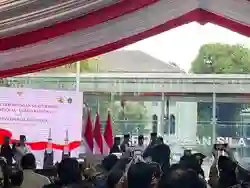Elite School in Darwin to Close Indonesian Language Program
Essington, one of the most prestigious schools in Darwin, has announced the closure of its Indonesian language program. The school stated to ABC that after “teaching Indonesian for a long time,” the program will end at the conclusion of the first semester in 2025.
-
The decision to discontinue the Indonesian language program was based on a comprehensive review of curriculum priorities, parental feedback, and student involvement, according to a school spokesperson.
-
Luke Gosling, a local member of parliament, described it as a “significant backward step” for the government and private schools to overlook the importance of Indonesia, a large and strategically vital neighbor.
-
Parents have not yet been consulted about the closure, and alternative languages have not been offered.
-
The school intends to consult with families in early 2025 to explore preferred language options while reaffirming its commitment to equip students with global skills.
-
The closure follows a similar decision by Scotch College, a leading school in Melbourne, earlier this year.
Concerns and Calls for Greater Support
-
Educational Figures’ Responses:
-
Bayu Prihantoro, an Indonesian language assistant at Scotch College, highlighted students’ enthusiasm for learning Indonesian and expressed disappointment at the sudden removal of the program.
-
Mukhamad Najib from the Indonesian Embassy in Canberra urged Australia to allocate more resources to Asian language education, emphasizing the responsibility of the Australian government in strengthening Indonesian language learning.
-
Alistair Welsh from Deakin University and Silvy Wantania from the Indonesian Teachers’ Association in Victoria raised concerns about ideological reasons behind such closures and the importance of updating teaching materials to reflect modern Indonesia.
Challenges and Advocacy
-
Decline in Interest: Silvy Wantania attributed the declining interest in learning Indonesian to a prevalent perception among Australians that Indonesia is less important compared to Western or other Asian countries.
-
Tourism and Investment: While Australian tourism to Indonesia has surged, investment in language education lags behind. Negative public perceptions, fueled by past events, pose obstacles to Indonesian language learning in Australia.
-
Educational Strategies: Calls have been made for updated curriculum materials that integrate contemporary Indonesian culture, such as music and film, to better reflect the rapidly developing nation.
-
Government Commitment: The Australian Department of Education affirmed its support for language teaching, including Indonesian, acknowledging the cognitive, academic, and cultural benefits for students.
-
Future Outlook: Despite challenges, advocates stress the enduring importance of Indonesia as a close neighbor and significant global player, emphasizing the need for stronger educational ties between Australia and Indonesia.

 Prabowo: Perbedaan Harusnya Tak Menjadi Pemisah, Melainkan Kekayaan
Prabowo: Perbedaan Harusnya Tak Menjadi Pemisah, Melainkan Kekayaan